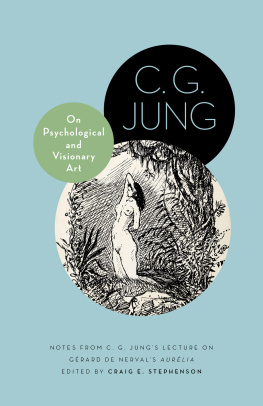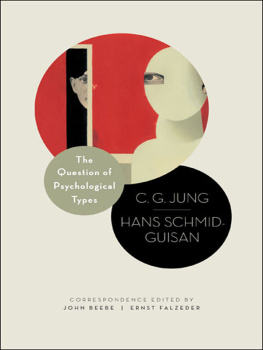BOLLINGEN SERIES XX

THE COLLECTED WORKS
OF
C. G. JUNG
VOLUME 6
EDITORS
SIR HERBERT READ
MICHAEL FORDHAM, M.D., M.R.C.P .
GERHARD ADLER, PH.D .
WILLIAM MCGUIRE , executive editor
PSYCHOLOGICAL
TYPES
C. G. JUNG

A REVISION BY R. F. C. HULL
OF THE TRANSLATION BY H. G. BAYNES
B O L L I N G E N S E R I E S X X


COPYRIGHT 1971 BY PRINCETON UNIVERSITY PRESS, PRINCETON, N.J .
Second printing, 1974
First P RINCETON /B OLLINGEN P APERBACK printing, with corrections, 1976
THIS EDITION IS BEING PUBLISHED IN THE UNITED STATES OF AMERICA BY PRINCETON UNIVERSITY PRESS AND IN ENGLAND BY ROUTLEDGE & KEGAN PAUL, LTD. IN THE AMERICAN EDITION, ALL THE VOLUMES COMPRISING THE COLLECTED WORKS CONSTITUTE NUMBER XX IN BOLLINGEN SERIES. THE PRESENT VOLUME IS NUMBER 6 OF THE COLLECTED WORKS AND WAS THE SIXTEENTH TO APPEAR .
Except for the appendix, originally published in German as Psychologische Typen, Rascher Verlag, Zurich, 1921. Including appendix, published as volume 6 in the Gesammelte Werke, Rascher Verlag, Zurich, 1960; 2nd edition, 1967. The H. G. Baynes translation of Psychological Types was published in 1923 by Kegan Paul, London, and Harcourt, Brace and Co., New York.
ISBN 0-691-01813-8 (paperback edn.)
ISBN 0-691-09770-4 (hardcover edn.)
LIBRARY OF CONGRESS CATALOGUE CARD NUMBER: 75-156
MANUFACTURED IN THE U. S. A .
EDITORIAL NOTE
Jung was engaged in the preparatory work for Psychological Types during his so-called fallow period, from 1913 to 1917 or 1918, a time of intense preoccupation with the images of his own unconscious, which he describes in the sixth and seventh chapters of Memories, Dreams, Reflections. As he wrote: This work sprang originally from my need to define the ways in which my outlook differed from Freuds and Adlers. In attempting to answer this question, I came across the problem of types; for it is ones psychological type which from the outset determines and limits a persons judgment. My book, therefore, was an effort to deal with the relationship of the individual to the world, to people and things. It discussed the various aspects of consciousness, the various attitudes the conscious mind might take toward the world, and thus constitutes a psychology of consciousness regarded from what might be called a clinical angle.
Psychologische Typen was published by Rascher Verlag, of Zurich, in 1921. It was translated into English by H. G. Baynes (18821943), who during 191922 was Jungs assistant in Zurich and subsequently became one of the most prominent British analytical psychologists. His translation, subtitled The Psychology of Individuation, was published in 1923 by Kegan Paul in London and Harcourt, Brace in New York. Some 22,000 copies of the Baynes version were sold. Translations have also appeared in Dutch, French, Greek, Italian, Japanese, Portuguese, Russian, Spanish, and Swedish.
By 1950, the Swiss edition had gone through seven reprintings (some 15,000 copies), with little revision. The work was published as Band 6 in the Gesammelte Werke in 1960; for that edition the text was slightly revised, partly with the help of the author, quotations and references were checked and corrected, and a definition of the self, formulated by Professor Jung for the edition, was added. In the original the self had figured under the concept of the ego. In accordance with the previously announced plan of the Collected Works in English, an appendix was added containing an important preliminary study for the present book, a lecture delivered at the Psychoanalytical Congress in Munich, 1913, entitled A Contribution to the Study of Psychological Types, and three other short works on typology (1925, 1928, 1936). A corrected edition of Band 6 appeared in 1967.
The present volume is one of the last to appear in the Collected Works. Owing to the continued availability of the Baynes translation in Great Britain and the United States, and the fact that Jung never subjected this work to revision (other than in minor details), the Editors have given precedence to issuing other volumes of which translations were lacking or inadequate.
The Gesammelte Werke version, in its second, corrected edition, is the basis of the present translation. The paragraph numbering of the Swiss and English editions differs, chiefly because it is the policy of the Collected Works to print quotations in smaller type and not number them as paragraphs. Furthermore, some of the very long paragraphs in the Swiss text have been broken up. For the convenience of readers who wish to compare passages in the two editions, a table of comparative paragraph numbers is given in the back of this volume.
The numbers of the Definitions fail to correspond among the various editions, owing to the vagaries of alphabetical order.
When quoted translations contain modifications, the indication Cf. is given in the pertinent footnote. Grateful acknowledgment is made for permission to quote as follows: to Pantheon Books, a Division of Random House, Inc., for Lawrence Grant Whites translation of the Divine Comedy; to Penguin Books Ltd., for Philip Waynes translation of Goethes Faust; to Oxford University Press, New York, and Faber and Faber, Ltd., for Louis MacNeices translation of Faust.
The Editors wish to acknowledge their gratitude to the late A.S.B. Glover, who contributed research assistance, various translations of Latin quotations, and wide-ranging advice, to this as all the other volumes in the edition.
See infra, Foreword to the Argentine Edition.
TABLE OF CONTENTS
Carl Spitteler: Prometheus and Epimetheus
FOREWORD TO THE FIRST SWISS EDITION
This book is the fruit of nearly twenty years work in the domain of practical psychology. It grew gradually in my thoughts, taking shape from the countless impressions and experiences of a psychiatrist in the treatment of nervous illnesses, from intercourse with men and women of all social levels, from my personal dealings with friend and foe alike, and, finally, from a critique of my own psychological peculiarity.
It is not my intention to burden the reader with case material; my concern is rather to show how the ideas I have abstracted from my practical work can be linked up, both historically and terminologically, with an existing body of knowledge. I have done this not so much from a need for historical justification as from a desire to bring the experiences of a medical specialist out of their narrow professional setting into a more general context, a context which will enable the educated layman to derive some profit from them. I would never have embarked upon this amplification, which might easily be misunderstood as an encroachment upon other spheres, were I not convinced that the psychological views presented in this book are of wide significance and application, and are therefore better treated in a general frame of reference than left in the form of a specialized scientific hypothesis.
Next page









